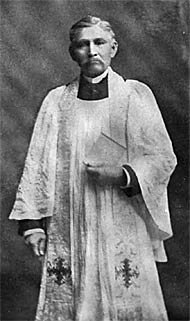Readings:
Psalm 90:1-2, 14-17
Amos 5:14-15
Romans 14:12-19
John 10:7-18Preface of God the Father
[Common of a Pastor]
[For the Ministry]
[For Reconciliation and Forgiveness]
PRAYER (traditional language)
Everliving Lord of the universe, our loving God, who raised up thy priest
Cornelius Hill, last hereditary chief of the Oneida nation, to shepherd
and defend his people against attempts to scatter them in the wilderness:
Help us, like him, to be dedicated to truth and honor, that we may come
to that blessed state thou hast prepared for us; through Jesus Christ,
who with thee and the Holy Spirit livest and reignest, one God, in glory
everlasting. Amen.
PRAYER (contemporary language)
Everliving Lord of the universe, our loving God, you raised up your priest
Cornelius Hill, last hereditary chief of the Oneida nation, to shepherd
and defend his people against attempts to scatter them in the wilderness:
Help us, like him, to be dedicated to truth and honor, that we may come
to that blessed state you have prepared for us; through Jesus Christ,
who with you and the Holy Spirit lives and reigns, one God, in glory everlasting.
Amen.
This commemoration appears in A Great Cloud of Witnesses.
Return to Lectionary Home Page
Webmaster: Charles Wohlers
Last updated: 25 April 2020
CORNELIUS HILL
PRIEST and CHIEF AMONG THE ONEIDA, 1907
 Cornelius Hill (November 13, 1834 – January 25, 1907) or Onangwatgo (“Big Medicine”) was the last hereditary chief of the Oneida Nation, and fought to preserve his people's lands and rights under various treaties with the United States government. A lifelong Episcopalian, he was ordained a priest at age 69, and ministered to his people until shortly before his death.
Cornelius Hill (November 13, 1834 – January 25, 1907) or Onangwatgo (“Big Medicine”) was the last hereditary chief of the Oneida Nation, and fought to preserve his people's lands and rights under various treaties with the United States government. A lifelong Episcopalian, he was ordained a priest at age 69, and ministered to his people until shortly before his death.
Cornelius Hill was born on tribal lands in Wisconsin and baptised by missionary bishop Jackson Kemper. In 1843, Episcopal missionary the Rev. James Lloyd Breck escorted the ten-year-old and two other boys to the newly established Nashotah House to learn English and be educated.
As a teenager, at a council of Oneida from New York, Canada and Wisconsin, Hill became a chief of his Bear Clan.
White settlers were moving into Wisconsin, and coveted tribal lands, which were held in common under an 1838 treaty. Pursuant to the Dawes Act of 1887, the federal government allocated the tribe's Wisconsin land to individuals beginning in 1892, who were to be allowed to transfer that property after a 25-year waiting period. As had happened in New York State, unscrupulous persons often tried to swindle tribal members out of their allocations. Throughout his life, Hill fought such dismemberment of tribal property, as well as government attempts to move his people further west. In 1893 after negotiations with the federal government, Hill, together with the Rev. Solomon S. Burleson (also a lawyer and doctor), secured a hospital and boarding school for the reservation.
Having for years served as an organist and interpreter for Episcopal services by the Rev. Goodnough and his successors, as well as being his tribe's sachem and delegate to church councils, Hill thought ordination would bring additional authority among whites as well as help him become a bridge between the cultures. On June 27, 1895, Bishop Charles C. Grafton ordained Hill a deacon. On June 24, 1903, Bishop Grafton ordained Hill as a priest, the first of his people; during the ceremony Hill repeated his vows in his native language.
Hill died on January 25, 1907, having fallen ill shortly before Christmas. After three requiems and funeral at the Church of the Holy Apostles attended by 800 persons, he was buried in the graveyard with other tribal members and the missionaries he assisted.
Further information may be found at Wikipedia and in Chapter 25 of the book The Oneida, by Julia Keen Bloomfield.